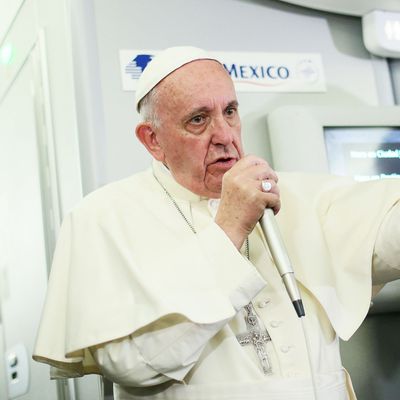
Pope Francis has had some week. Aboard the papal plane en route to Rome on Thursday, in response to a reporter’s question about the use of contraception to prevent the conception of children afflicted with deformities possibly linked to the Zika virus, he said this: “Avoiding pregnancy is not an absolute evil.” What? What does that even mean? Certain news organizations, smitten with Francis and hopeful of a more permissive church, were moved to interpret these remarks as a loosening of traditional strictures, a sign that under certain extenuating circumstances contraception might not be verboten after all. “Contraception can be condoned,” wrote the Guardian. ”Contraceptives OK,” wrote CNN.
But that isn’t, actually, what Francis said; he was not making any meaningful statement about church doctrine. Instead, the pope was splitting hairs, walking a fine line between the established doctrine of his Church and the wishful thinking of his fans — a line he has walked masterfully since he ascended to the throne of Peter, sending rhetorical signals about a modernizing, liberalizing church while not moving much on actual policy. (Just how much you think this counts as progress, and how much political savvy you think it entails to allow a basically backwards church to have it both ways, probably depends a lot on how moved you’ve been by Francis’s progressive PR campaign.) In his remarks on the plane, he positioned contraception as a lesser evil to abortion – which certain global health officials have suggested as an option for women concerned about the effects of Zika and which Francis characterized as “a crime.” But, no matter what CNN reported, the pope opened no new doors on birth control; he lifted no sanctions. The Roman Catholic Church still condemns the use of ‘artificial’ means of contraception, which the Catechism still describes as “intrinsically evil.” In that light, his comments were not exactly another sign that the pope is a liberal superhero. They were more a reflection of his gift for political showmanship — knowing how to mostly mollify a fractious Church — on which that superhero reputation has been built.
Political showmanship has value, of course, but perhaps on no question more than contraception are Francis’s liberal bona fides more in doubt. As his predecessors have done, this Pope – the world’s pastor — has stood by and watched as millions of people have died annually of AIDS, particularly in Africa, refusing to promote condoms as a sensible public-health measure even in the face of that fatal epidemic. Death rates have dropped sharply since the introduction of antiretroviral drugs, but even so, more than a million people died of AIDS-related causes in sub-Saharan African in 2013 alone, according to UNAIDS – the year before Francis became pope. That same year, 250,000 people died of AIDS in Asia and the Pacific and 47,000 people died in Latin America. Nevertheless, in November, Francis himself chided reporters for dwelling on this issue of condoms as potential HIV prevention overly much. The question of whether the church should revise its position was “too small, partial,” the pope complained — “so technical,” when so many people lack basic housing and nutrition. It was a politician’s evasion — Bernie-esque in its redirection of focus toward grand claims in the hope that thornier practical problems might disappear. More technical than a much smaller health crisis limited to one area of Brazil? That Francis is talking about contraception now, in the limited way he is, says a lot less about his flexibility on condoms than his instinct for the political moment. And of course it doesn’t hurt that he expects that, unlike AIDS, Zika will pass quickly; in fact, he concluded his remarks on Zika by urging scientists to hurry up and find a vaccine.
Of course, all popes are politicians, some more or less explicitly so (John Paul II was visibly in the room with Ronald Reagan and Margaret Thatcher as they orchestrated “the fall of communism”). Francis has chosen to wage his politics thus far with a pastoral bent, focusing the world’s attention on the message of the gospels and the needs of the poor. But the condom comments were not the end of things for Francis. On the plane he also showed that he is interested in politics on a more granular level — not just urging compassion for the poor and the planet, but, well, rhetorically bitch-slapping the Republican presidential candidate Donald Trump in public. “A person who thinks only about building walls, wherever they may be, and not building bridges, is not Christian,” he said, in reference to Trump’s proposed (anti-) immigration policy, triggering a hailstorm of headlines around the world. (Trump, for what it’s worth, has said he is a Christian and is a devotee of the optimistic brand of the faith promoted by the self-help preacher Norman Vincent Peale. He also collects Bibles.)
To many — even Trump opponents — these comments seem below the papacy. But Francis has much more at stake in American immigration policy than questions of theology. You might even say it’s political. One in five Americans identify as Catholic, and the proportion of those who were born in Latin America – notably in Mexico, the country from which the papal plane took off last week – is growing fast. According to a recent Pew poll, 27 percent of American Catholics were born outside the U.S., and an additional 15 percent have one foreign-born parent. The white Irish, Polish, and Italian Catholics who over the past century have stood for Catholic culture in America, have in one generation been replaced by the very people that Trump wants to exclude. For Francis, then, any prospective immigration plan by any presidential candidate pertains directly to his church’s survival in America. He is not bashing Trump because he thinks the man’s an idiot; he is bashing him because American Catholicism will only grow and thrive if Spanish-speaking immigrants continue to fill the pews left empty when the grandchildren of the European stone cutters who built the urban parish churches moved to the suburbs and, for one reason and another, abandoned their childhood faith. For Francis, American immigration policy is a matter of Church life and death. Unlike, say, AIDS.
Note, too, that Francis used the phrase “not Christian” to take down Trump, knowing – as he must – that “Christian” is the preferred moniker among every brand of conservative evangelical believer these days, including some Catholics. “Christian” denotes a purity of belief, a casting off of tribalism and labels, an adherence to the words of Jesus without the small-minded devotion to denominational distinctions that have dogged Christian history. This is, ironically, the kind of faith Francis would have the world believe he embodies and upholds – a trick for a man whose job description requires him also to preserve centuries of antique doctrine as law, to figure out a way to board a jetliner in the 21st century and defend, say, a ban on condoms in the face of contagious disease. The term amounts to a claim on behalf of Catholics to the religious heart of American Christianity — quite a dramatic political gesture, actually.
Francis walks this line better than any pope in memory, navigating in and out of terrestrial politics masterfully. “Who am I to judge?,” his most famous statement of open-heartedness, is not after all an overt embrace of homosexuals or same-sex love, nor a doctrinal shift, but merely a personal expression of humility and imperfection – welcome, yes, but withholding, too, and therefore, ultimately, a particularly genius version of the political “no comment.” With his pointed Trump remark, though, Francis has done something different, descending from on high into the mire of American politics. He’s picked a side. Frankly, though he’s sure to be criticized for abandoning his throne, I wish he’d do it more.






























